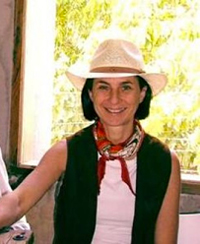| « Previous | News | Next » |
March 12, 2014
Architect, Wife of a Diplomat, Winemaker - Who is this Woman?

Architect, mother, wife of a diplomat: Anabelle Sielecki wears many hats, but for the last 12 years she's been occupied as proprietor of Mendel Wines, a small-scale winery in Mendoza, Argentina, focused on producing high-quality wines in a limited volume. Sielecki founded the vineyard and brought Roberto de la Mota on board, son of Argentina's "Winemaker of the Century," Raul de la Mota. Together, they've set out to carefully cultivate their grapes and craft their wines into reflections of Mendoza's unique terroir.
Much of the work begins in the vineyard. Their 80-year-old Malbec and Cabernet Sauvignon vines are located on high-altitude (900-1100 meters), alluvial soils in Lujan de Cuyo, Mendoza. They practice artisan flood irrigation, tightly controlling it based on each individual block's stress levels and yields. The vines are on their original rootstocks, so flood irrigation is an important control against phylloxera. Everything from harvesting to sorting to maceration is done by hand. Aging takes place in the finest French oak barrels.
All this attention to detail has produced a suite of Malbecs, Semillon, and blends that express intensity and complexity, and regularly receive scores over 90 from Wine Spectator and the Wine Advocate. We're lucky to have Anabelle visit us in Chicago this week, so we sat down with her to pick her brain about her interests, vinous and otherwise.
Cream: You bring such a unique background to wine. How did you go from architecture to wine? Aside from a concern with place do you find that there is any crossover between your professional interests? Do you still practice architecture?
AS: With architecture, I am building abstract designs in a determined location. The architect plus program create a building made with diverse materials, and almost always clash with the environment. Viticulture, however, involves growing roots into the soil, and creating something that amazingly goes hand in hand with the nature of the place. I practiced architecture for a few years, developing real estate. Because of an economic crisis in the sector over 12 years ago, I started looking at other projects, and along came some old vineyards in Mendoza. I still practice architecture as a hobby, doing very small renovations and concepts.
Cream: I've read that you split your time between Washington, D.C., and Mendoza. I'm curious of your take on how wine culture varies on the two continents. Especially as the wife of an ambassador, I'm guessing you have a good sense of cultural identities.
AS: I was splitting my time between D.C. and Argentina until a couple of years ago. My husband was stationed in D.C., so I took advantage and stayed in order to get to know this beautiful city and many other areas of the country, and to get to meet wine people and talk to them about wine. Wine is now a very globalized drink in the western world. Obviously in some regions there are more women drinking rose wines, or white wines, and different varietals or blends go better given the climate of the cities, and also there are traditions of drinking at play. In Central America, for example, there was historically a more embedded tradition of drinking harder liquors, and almost no wine. Slowly, trends have changed and the world has become a bit more homogenized. Of course, countries in the Baltic, Russia, etc., have a long tradition of drinking white liquors, and even if some people now drink wines, it is still a very small percent of the population. The climate is a factor in people's habits of drinking harder alcohols. You also have many countries that do not consume alcohol, some for religious reasons, and protocol calls for not serving them these drinks.
But having said this, I must confess I was very surprised at the huge amount of people who know about Malbec and other wines from Argentina. Almost everyone I've encountered has tasted a Malbec wine and liked it.
Cream: Mendel was named after your father. How did he inspire the personality of the company?
AS: My dad was an immigrant, a self-made man who came to Argentina in 1926, from what was considered one day Russia and Poland the next. He managed to establish a pharmaceutical business and be successful. He appreciated the best quality in things, be it a work of art, a building, or a glass of Champagne. My brothers and I were taught early in life that we did not have to settle until we got the best possible products.
Cream: Do you work closely with Roberto de la Mota in the cellar? Has he brought any techniques or ideas to winemaking that have surprised you?
AS: I work very closely with Roberto. He is our partner, our winemaker, our friend and our inspiration for this project. Any technique he brings along is never questioned--we assume he is always right. Roberto has a rare gift of combining best technique with the finest sensibility.
Cream: We have a lot of wine geeks in our readership--any fun or particularly geeky technology/techniques that you guys employ in the winemaking process?
AS: Roberto has tried numerous techniques in the last ten vintages. Some have been successful, some not quite (some of his experiments we'll never taste). The one I like most is the way he discovered the perfect aging technique for our Semillon. When he made the first vintage of Semillon, it was quite a small amount, about 3,000 bottles. He wanted to use some wood, and ended up using about 15 percent American oak that time. The wine came out fantastic. When we asked why he used that exact percentage, he responded quite frankly..... because that was what was on hand at the time. Needless to say, we still use the same percentage of American oak.
Cream: What's your own passion in wine? Is your heart in Argentinian wines or do you have favorites in other regions as well?
AS: I like wines from different countries in addition to Mendoza Malbecs and Cabernet Sauvignon blends. I like Burgundy, Pomerol, Priorat, Amarone, and Super Tuscans. I enjoy tasting the wines in their contexts, and if I travel to a country I try to concentrate my wine drinking to only that made in the specific region.
Cream: Chicagoans love Malbec. It seems to be the perfect wine to reach for during our polar vortex winter. Anything you're looking forward to doing or drinking while in town?
AS: I am delighted to hear Chicagons like Malbecs. I hope they are also open to other varietals--Malbec is just one example of a fine Argentinian wine. While in Chicago, I'm looking forward to enjoy a typical meal from the region.
